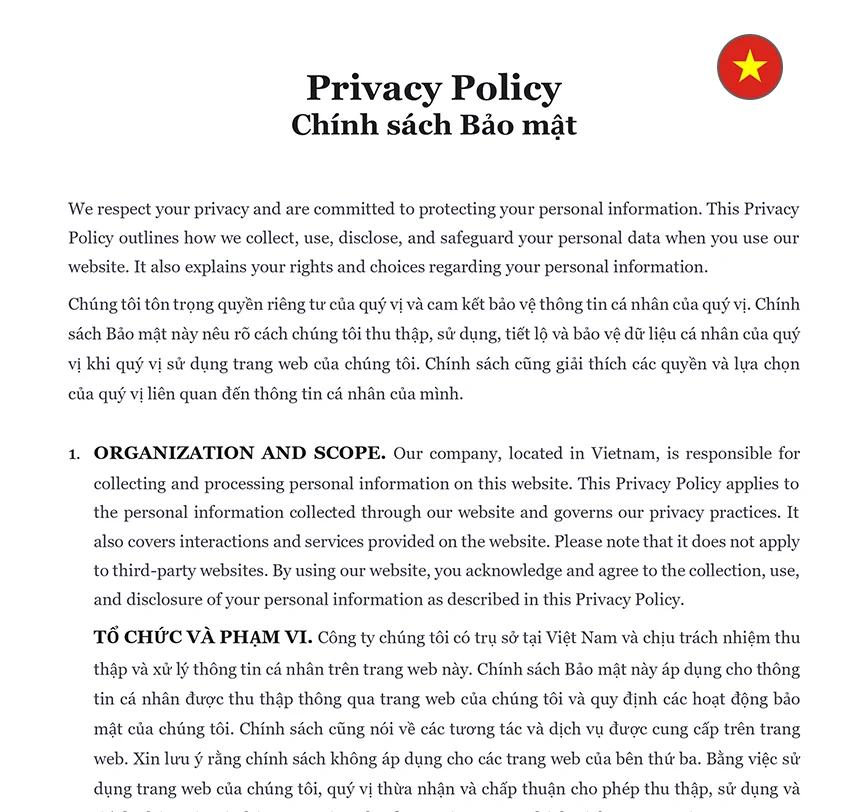Ready to use legal template
Drafted by experienced lawyers
Vietnamese-English translation
Ready to use legal template
Drafted by lawyers
Vietnamese-English translation
Home › Intellectual property › Privacy Policy
Learn more about Website Privacy Policy in Vietnam
In the digital era, safeguarding personal information is paramount, underscoring the significance of a robust Privacy Policy for businesses. Our dedicated team of legal experts has professionally crafted a comprehensive Privacy Policy template, meticulously aligned with the stringent regulations outlined by Vietnamese law. This template serves as a foundational document for businesses, offering clear guidelines on the collection, use, and protection of personal data. Delivered in an easily editable Word format, our Privacy Policy template ensures adaptability while adhering to legal standards, empowering businesses to maintain compliance effortlessly while prioritizing user privacy and trust.
Table of contents
What is a Privacy Policy?
What is included in a Privacy Policy?
Why use a Privacy Policy in Vietnam?
How does it differ from Terms and Conditions?
What happens if I don’t have a Privacy Policy in Vietnam?
How does it comply with privacy regulations?
How does it address personal data collection?
How does it address cookie consent in Vietnam?
What is a Privacy Policy?
A Privacy Policy is a fundamental document that articulates an organization’s approach to handling personal information collected from users, customers, or visitors. It serves as a contractual agreement between the entity and its users, delineating the terms under which personal data is gathered, processed, and protected. Typically found on websites, mobile apps, or other digital platforms, this document outlines the types of information collected (such as names, email addresses, or browsing activity), the purposes for which it is collected (such as account creation, transaction processing, or marketing communications), and the methods used to safeguard this data from unauthorized access or misuse.
Beyond its role in setting expectations for data handling practices, a Privacy Policy also fulfills legal requirements established by privacy laws and regulations. These laws, which vary by jurisdiction, often mandate that businesses and organizations inform individuals about their data processing activities and provide them with certain rights regarding their personal information. As such, a well-drafted Privacy Policy not only fosters transparency and trust with users but also ensures compliance with applicable privacy legislation, helping organizations avoid potential legal risks and penalties associated with non-compliance.
What is included in a Privacy Policy?
A Privacy Policy typically includes several key components to provide comprehensive information to users about how their personal data is collected, used, and protected. These components may vary depending on the nature of the organization and the applicable legal requirements, but commonly included elements are:
Introduction: A brief overview of the purpose and scope of the Privacy Policy.
Types of Information Collected: Description of the types of personal information collected, such as names, email addresses, contact details, payment information, or browsing activity.
Methods of Collection: Explanation of how personal data is collected, whether through website forms, cookies, mobile apps, or other means.
Purpose of Data Use: Details about how collected information is utilized, including for account creation, order processing, marketing communications, personalization, or analytics.
Data Sharing: Disclosure of any third parties with whom personal data may be shared, such as service providers, business partners, or regulatory authorities.
User Rights:
Information about user rights regarding their personal data, such as the right to access, correct, update, or delete information.
Data Security Measures: Description of the security measures implemented to protect personal information from unauthorized access, disclosure, alteration, or destruction.
Data Retention Policy: Explanation of how long personal data is retained and the criteria used to determine retention periods.
Cookies and Tracking Technologies: Disclosure of the use of cookies, tracking pixels, or other technologies for tracking user behavior and preferences.
Legal Basis for Processing: Identification of the legal basis for processing personal data, such as consent, legitimate interests, contractual necessity, or legal obligations.
Policy Updates: Statement indicating how users will be notified of changes or updates to the Privacy Policy.
Including these components helps ensure that the Privacy Policy is comprehensive, transparent, and compliant with relevant privacy laws and regulations.
Why use a Privacy Policy in Vietnam?
Using a Privacy Policy in Vietnam is essential for several reasons:
| ➤ Legal Compliance: Vietnamese laws and regulations mandate that businesses and organizations handling personal data must inform individuals about their data processing activities and provide transparency regarding how their personal information is collected, used, and protected. A Privacy Policy helps ensure compliance with these legal requirements, reducing the risk of penalties or legal actions for non-compliance. |
| ➤ Building Trust: A transparent and well-crafted Privacy Policy fosters trust and confidence among users by demonstrating a commitment to protecting their privacy rights. When users have clarity about how their personal data is handled, they are more likely to feel comfortable engaging with your business or using your services. |
| ➤ Protecting User Rights: A Privacy Policy outlines the rights of individuals regarding their personal data, such as the right to access, correct, update, or delete information. By providing this information upfront, businesses empower users to exercise control over their data, enhancing transparency and accountability. |
| ➤ Mitigating Risks: Having a comprehensive Privacy Policy helps mitigate risks associated with data breaches, unauthorized access, or misuse of personal information. By implementing clear data protection measures and guidelines outlined in the Privacy Policy, businesses can minimize the likelihood of security incidents and protect both user data and their reputation. |
| ➤ International Operations: For businesses operating internationally or engaging with users outside of Vietnam, having a Privacy Policy that complies with global privacy standards, such as the General Data Protection Regulation (GDPR), enhances credibility and facilitates cross-border data transfers. |




